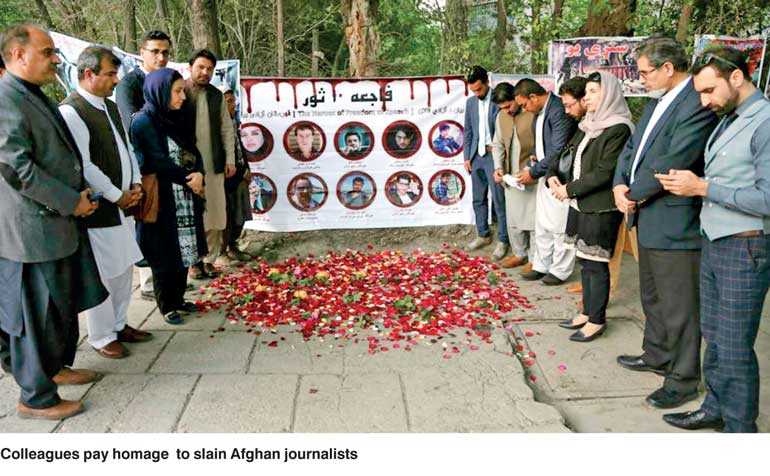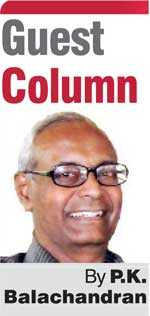Saturday Feb 21, 2026
Saturday Feb 21, 2026
Saturday, 5 May 2018 00:47 - - {{hitsCtrl.values.hits}}

Journalists appear to be under varying degrees of duress in most countries of South Asia, except Bhutan and Nepal. The international media watchdog Reporters Sans Frontières (RSF) has placed war-torn Afghanistan in the 118th place in a list of 180 countries surveyed in 2017.
At least 15 Afghan journalists and media workers were killed, many in targeted attacks in 2017. Early this month, an Islamic State (IS) suicide bomber killed nine media personnel including the veteran AFP photographer Shah Marai in Kabul. A day later, the BBC’s Ahmad Shah was shot dead.
In some provinces, the Taliban forced the media to pay arbitrary taxes which were actually ransoms. Many provincial governors and officials did not accept media independence, and the police and military implicated journalists in many cases, RSF said.
Pakistan
In Pakistan, ‘Press Freedom Barometer 2018’ documented 157 cases of physical assault, threats, illegal detention, arrest and murder between 1 May 2017 and 1 April this year.
The violations included killing of five journalists for their work; 11 cases of attempted kidnapping or abduction; 39 cases of illegal detention and arrest; and 58 of physical assault and vandalism; and 23 cases of verbal and written threats. Homes of five journalists were attacked and there were 16 cases of legal proceedings against media men.
Islamabad, the capital, emerged as “the riskiest and most dangerous place to practice journalism in the country with 35% or 55 of the total violations recorded in the federal capital”.
The most targeted medium remained television with 85 cases recorded against journalists associated with it the compared to print, radio and online media. Groups which threatened journalists included State and non-state actors and political and religious parties.
India
India has slipped from 136 to 138 in the RSF list, though the country is still ahead of Pakistan, Iran, Iraq and China.
Over the past three years, 90 journalists were attacked, according an official response in the Upper House of parliament
The Bharatiya Janata Party (BJP) led by Prime Minister Narendra Modi came to power in India in 2014 promising clean and transparent governance. But it has created fear. Journalists are forced to exercise self-censorship. The social media which was the freest, has now come under pressure.
In April, the Government decided to form a committee to frame a regulatory framework to control on-line content beyond what is already there in the IT Act.
More than 100 journalists wrote to the Information Minister Smriti Irani to say that a new law would be both unnecessary and dangerous. The journalists pointed out that the IT Act itself goes beyond laying down guidelines and incorporates stiff punishments. Then there is the Indian Penal Code containing clear dos and don’ts for sharing of content even through the internet.
“Our position is that online content is different from print and television content, because most of it is produced by individual citizens in exercise of their constitutional right to freedom of expression, and embodies two way communication and interactivity, and not just publishing,” the journalists’ letter said.
“Any control of the online social media will open up the possibility of widespread abuse and attempts to suppress political dissent by the government and/or the regulating agency,” it warned.
Shekhar Gupta, Editor of ThePrint warned: “A government can simply issue a notification and bring in some equivalent of licensing and worse.”
Blocking of justice has become a practice under BJP rule. Government’s supporters blocked justice in rape cases in Kathua in Jammu and Kashmir and Unnao in Uttar Pradesh, he pointed out.
“For a country that boasts of being the largest democracy, it is a shameful tag to carry,” observes the online news outlet The Citizen.
It is pointed out that the Modi Government “celebrates” curtailment of the freedom of the press through coinages like “news traders” and “presstitutes”. Its supporters troll Government’s critics in the media as Swati Chaturvedi points out in her book ‘I Am A Troll’.
When a journalist is not killed or attacked, he or she is threatened with defamation cases and suits up to INR 1,000 million ($ 15 million).
 Bangladesh
Bangladesh
Bangladesh remains in the 146th place, behind India. Self-censorship appears to be the order of the day in this country, due to persistent acts of violence against those who criticise the constitution or Islam.
“Journalists and bloggers who resist censorship or self-censorship on these subjects risk life imprisonment or the death penalty, while Islamist militants often issue online calls for the murder of outspoken secularist bloggers and writers,” RSF points out.
At least 25 journalists and several hundred bloggers and Facebook users were prosecuted in Bangladesh in 2017 under the Information and Communication Technology (ICT) Act, which penalises online content that is regarded as defamatory or blasphemous.
Section 57 classes as a “non-bailable offence” any post, image, or video in an electronic format that causes a deterioration in law and order, or which prejudices the image of the state or person, or hurts religious beliefs. The punishment for a successful conviction ranges from seven to 14 years in prison, and a fine of up to Tk 10 million ($ 118.431).
There has also been a sharp rise in the number of cases being brought each year. Cases under ICT Act were 33 in 2014, 152 in 2015 and 233 in 2016. Over just six months in 2017, 391 cases were filed.
In response to the heavy criticism of the ICT act, the cabinet in January 2018 approved the draft of Digital Security Act 2018 while keeping the provision for jail terms and fines.
Nepal
Nepal’s press freedom seems to be improving compared to previous years. The RSF ranked Nepal as a country with the second-most free press in South Asia in 2017, just behind Bhutan.
According to the Federation of Nepali Journalists (FNJ), not a single journalist (including citizen journalists or media assistants) was killed or displaced from their workplace due to their journalistic performance in 2017. There were fewer cases against press freedom and the security of journalists in comparison to past years.
This being said, Nepal is not entirely free of problems. In the multiple elections and political campaigns held this year, many journalists were arrested, attacked, and threatened.
Sri Lanka
RSF has put Sri Lanka in the “bad” or “red” category (above very bad, but below Good, Fairly Good, Problematic). It is placed at 131 in a list of 180.
In an article in Groundviews, human rights activist Ruki Fernando says that the Army and Police appear determined to restrict reporting on matters considered to be sensitive such as disappearances, remembering war-dead, Sinhalisation, land, militarisation and anything critical of the Government.
He points that there has been impunity in the case of past violations. Except cases of Editors Lasantha Wickrematunge and Keith Noyahr, most serious violations such as killings and disappearances of journalists and media workers and arson attacks on media institutions during the war years have not been investigated. Or, investigations have languished as in the case of the disappearance of cartoonist Prageeth Eknaligoda.
Tamil journalists in the former war zone in the Northern Province continue to be monitored or hauled up by the police, military and intelligence agencies, Fernando alleges.
In March this year, the Army reportedly detained and questioned S. Thavaseelan who was reporting on the Army’s alleged attempts to seize the land of a destroyed LTTE cemetery. He was allegedly told that his “days were numbered”.
In December last year, a group of Tamil journalists doing research on Sinhalisation in the Tamil majority Mullaitivu District were reportedly detained and questioned by the Army and Police; their cameras and equipment were seized; and the photos and videos deleted.
Maldives
Maldives has fallen three places in the RSF list after the murder of blogger Yameen Rasheed and further restrictions on the media. Maldives now ranks 120 out of 180 countries, down from 117 the previous year.
According to RSF, the Abdulla Yameen Government “continues to persecute the independent media”, and religious groups continue to threaten independent writers and bloggers.
The 2016 anti-defamation law is being used to intimidate media outlets through fines. Raajje TV was fined on three occasions, paying MVR 1.7 million ($ 108,501) in fines in 2017. Two other opposition-aligned stations, Sangu TV and VTV were fined MVR 100,000 ($ 6382) and MVR 400,000 ($ 25,528) in March, RSF says.
The prosecution of the journalists was in stark contrast to the lack of justice for the abduction of Maldives Independent journalist Ahmed Rilwan; the arson attack on Raajje TV; and the near-fatal beating of the station’s former news head, RSF adds.